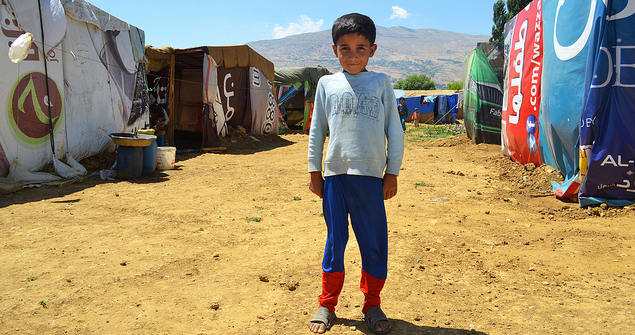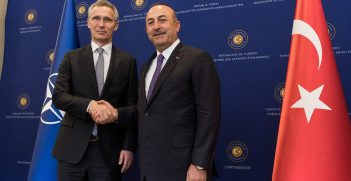Syria’s Refugees – The Perfect Storm

The international community’s unwillingness to tackle Syria’s refugee crisis has grave implications for regional stability.
I had the good fortune to live in Syria in the late 1970s and to have visited the place from time to time since then. My experience of the country is of a land of hospitable people and a remarkable historic and cultural heritage. That Syria is gone and with it the future of millions of its people who have lost everything as a result of the civil war that began in March 2011. Western governments must bear much of the blame for this on-going tragedy.
In the four years since the civil war started, more than nine million Syrians, out of a population of about 23 million, have fled their homes. Over 6.5 million of them are internally displaced – mostly forced by government and rebel actions into government-controlled areas. According to the United Nations High Commissioner for Refugees (UNHCR), a further three million have fled to Syria’s immediate neighbours – Turkey, Lebanon, Jordan and even Iraq.
Everything seems to be conspiring against the people of Syria. They suffer appalling levels of government and opposition violence. They must endure a persistent and devastating drought, which has driven three million people into poverty and aggravated the government’s declining capacity to provide the population with subsidised food.
Of great concern is the level of indifference that has characterised the international reaction to the situation. This has been manifest in the response to appeals for assistance from various United Nations and non-governmental organisations. For example, the UNHCR’s 2014 appeal fell US$1.7 billion short of the target of US$3.7 billion. Agencies trying to support the refugees are having to cut basic programmes, such as food aid. The United Nations has set its 2015 humanitarian appeal for Syria at US$8.4 billion, with over $5 billion committed to deal with refugee numbers which are expected to exceed four million by the end of the year.
The UN Secretary-General’s Regional Coordinator for Humanitarian Aid to the region remarked on the difficulty of getting Western countries to prioritise a humanitarian response to the crisis. The West tends to see the conflict in the context of the perceived terrorist threat and resources are directed at military engagement in the crisis. Refugee concerns tend to be swept aside as a result.
At the same time, there is a level of cynicism in the Western response. Military action is intended to slow the advance of and possibly contain Islamic State forces and to maintain the Syrian opposition’s capacity to resist the government in Damascus. There is no serious military or, more importantly, diplomatic effort to bring the fighting to an end. Western leaders are happy to allow the conflict to boil along as long as it is broadly contained within the region and does not threaten Western interests.
The travails of the regime in Damascus represent a useful opportunity for the Obama administration to apply pressure on the Iranian government. Tehran is committed to the survival of the Alawite regime in Damascus – if not the Assad family itself. However, Syria’s growing problems represent a challenge to Tehran, which is suffering from onerous economic and other sanctions.
The impact of the refugee crisis on Syria’s neighbours is significant. There are about 1.2 million refugees registered with the UNHCR in Lebanon, a country of around four million people. Many more Syrians as well as Palestinian refugees resident in Syria have crossed the border without registering with the UNHCR.
These numbers have grave implications for Lebanon. Lebanon’s government has warned of the country’s collapse as a result of the pressures caused by the influx of refugees from across the border. The government has, to its credit, been welcoming to those fleeing the violence but adequately addressing the refugee burden is beyond the capacity of this relatively poor country which is still struggling to put its own civil war behind it. Pressure on hospitals and schools and the refugees’ availability as cheap labour have affected many Lebanese. Security in the country has been deteriorating with the growing support among Lebanese Muslims and Syrian refugees for the more extreme opposition movements. The weak Lebanese army is struggling to control these groups and to maintain order in the country.
One of the most serious long-term impacts of the civil war has been on Syrian child refugees. As well as suffering malnutrition and acute emotional stress, children are missing years of schooling. In Lebanon thousands of Syrian children, many below the age of 14, are working on the streets or in sweat-shops. Many of these children are illiterate, having never been to school. The long-term consequences of this lost generation are likely to be considerable.
Jordan is also struggling to handle the one million refugees that have registered with the UNHCR. Unlike Lebanon, Jordan has an effective army and security service. Nevertheless, the refugee numbers are creating pressures on the Jordanian population leading to demands for government action. The recent murder of a Jordanian fighter pilot may well aggravate divisions that are developing in Jordanian society.
Turkey is the other country most affected by the refugee crisis. As many as 1.6 million people have sought refuge in Turkey since the conflict began. Many of those entering Turkey are Kurds and they contribute to the tensions between the government and the Kurds of Turkey.
The Syrian refugee crisis is casting a long shadow over the future of the region. The crisis is contributing to the advance of extremist movements and threatens to leave the countries of the area permanently unstable and increasingly poverty-stricken. The international community could bring the crisis to an end but that would require various governments to retreat from positions they have held since the beginning of the civil war. It would require a massive humanitarian commitment from foreign governments and a determined and sustained diplomatic effort in which all parties must be willing to make concessions, while also expecting something in return. There is no sign that the international community is ready for such a step.
Dr Anthony Billingsley is a Senior Lecturer of International Relations at the School of Social Sciences, Faculty of Arts and Social Sciences, UNSW. His main research focus is the Middle East and international law. This article can be republished with attribution under a Creative Commons Licence.




